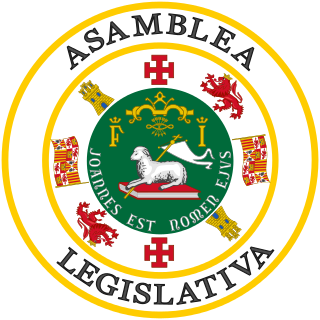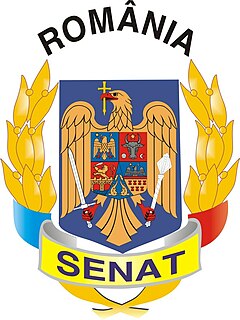 |
|---|
| This article is part of a series on the politics and government of Swaziland |
Monarchy |
Government |
|
|
Related topics |
The Senate of Swaziland is the upper chamber of the country's bicameral Parliament. The Senate may debate or pass a bill, with the exception of a "money bill", which must first be introduced in the lower chamber, the House of Assembly. [1]
An upper house is one of two chambers of a bicameral legislature, the other chamber being the lower house. The house formally designated as the upper house is usually smaller and often has more restricted power than the lower house. Examples of upper houses in countries include the Australian Senate, Brazil's Senado Federal, France's Sénat, Germany's Bundesrat, India's Rajya Sabha, Ireland's Seanad, Malaysia's Dewan Negara, the Netherlands' Eerste Kamer, Pakistan's Senate of Pakistan, Russia's Federation Council, Switzerland's Council of States, United Kingdom's House of Lords and the United States Senate.
A bicameral legislature divides the legislators into two separate assemblies, chambers, or houses. Bicameralism is distinguished from unicameralism, in which all members deliberate and vote as a single group, and from some legislatures that have three or more separate assemblies, chambers, or houses. As of 2015, fewer than half the world's national legislatures are bicameral.
Contents
The Senate must not exceed 31 members, and currently numbers 30. [1] The King of Swaziland appoints 20, while the remaining ten are elected by the House of Assembly. [2] Of these, at least eight of the 20 and at least five of the ten must be women. [2] However, according to the Inter-Parliamentary Union database, in 2008, there were 12 women senators instead of the minimum stipulated 13, [3] and in 2013, there were only ten. [4]

The Inter-Parliamentary Union is a global inter-parliamentary institution established in 1889 by Frédéric Passy (France) and William Randal Cremer. It was the first permanent forum for political multilateral negotiations. Initially, the organization was for individual parliamentarians, but has since transformed into an international organization of the parliaments of sovereign states. The national parliaments of 178 countries are members of the IPU, and 12 regional parliamentary assemblies are associate members. The IPU has permanent observer status at the United Nations General Assembly.
Election is by secret ballot in a first-past-the-post system of voting. [5] All senators serve five-year terms. Each senator must be at least 18 years old, a citizen, a registered voter, and have "paid all taxes or made arrangements satisfactory to the Commissioner of Taxes". [5] Disqualifications are: being insolvent under any law without having been "rehabilitated", being of unsound mind, sentenced to death or more than six months in prison for a crime in Swaziland, a member of the country's armed forces or holding or acting in a public office without being granted a leave of absence to serve in the Senate, unqualified to be a voter, otherwise disqualified by law, found incompetent to hold public office, connected to a firm with a government contract and having not made the proper disclosures regarding the contract, or holding or acting in any office connected with the conduct of any election or the compilation or revision of any electoral register. [5]

A first-past-the-post electoral system is one in which voters indicate on a ballot the candidate of their choice, and the candidate who receives the most votes wins. This is sometimes described as winner takes all. First-past-the-post voting is a plurality voting method. FPTP is a common, but not universal, feature of electoral systems with single-member electoral divisions, and is practiced in close to one third of countries. Notable examples include Canada, India, the United Kingdom, and the United States, as well as most of their current or former colonies and protectorates.
In July 2005, a new constitution was approved by the Parliament and signed by King Mswati III. The first election under the new constitution took place in September 2008. [2] The most recent election was held in September 2013. [2] Gelane Zwane ran unopposed and was elected President of the Senate for the third consecutive time. [6] Ngomuyayona Gamedze was chosen as Deputy President, also for the third consecutive time. [6] Six of the King's selections were members of his family. [7]

Mswati III is the King of Eswatini and head of the Swazi Royal Family. He was born in Manzini, Swaziland, to King Sobhuza II and one of his younger wives, Ntfombi Tfwala. He was Tfwala’s only child. He attended primary school at Masundvwini Primary School and secondary school at Lozitha Palace School. From 1983 to 1986, he attended Sherborne School in north-west Dorset, England. He was crowned as Mswati III, Ingwenyama and King of Swaziland, on 25 April 1986 at the age of 18, thus becoming the youngest ruling monarch in the world at that time. Together with his mother, Ntombi Tfwala, now Queen Mother (Ndlovukati), he rules the country as an absolute monarch. Mswati III is known for his practice of polygamy and currently has 15 wives. Although he is respected and fairly popular in Eswatini, his policies and lavish lifestyle have led to local protests and international criticism.
Later in 2013, the Senate banned Members of Parliament from divorcing while in office to "avoid embarrassing the king." [8]














